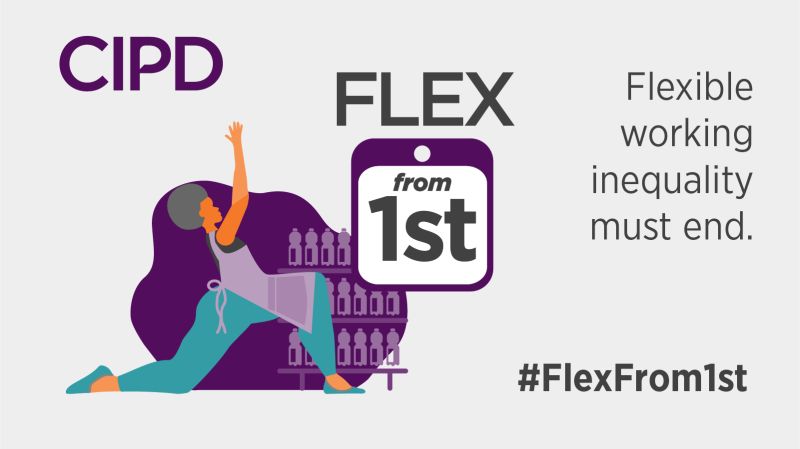02 February 2021
New research from the Chartered Institute of Personnel and Development shows that nearly half of UK employees do not have flexible working in their current role.
In response to this, The Chartered Institute of Personnel and Development (CIPD) is launching a new campaign #FlexFrom1st, encouraging employers to support flexible working for all and the right to request flexible working from day one of employment.
To reinforce these principles, the CIPD is also calling for a change in the law to make the right to request flexible working a day-one right for all employees.
“While many have hailed the pandemic as a driver for the adoption of flexible working practices, particularly around home working, the reality for many is that this is not the case."
–Peter Cheese
Chief Executive, CIPD
Flexible Working Should be a “Day One Right”
According to CIPD, the shift to home working has exposed a lack of flexible working opportunities for all and risks divisions in how employees feel they are treated.
Nearly half (46 per cent) of employees say they do not have flexible working arrangements, such as flexi-time, part-time working, compressed hours or job shares, in their current role.
The CIPD’s survey of over 2,000 employees found that while the Coronavirus pandemic has driven a huge increase in working from home, 44 per cent of employees have not worked from home at all since the beginning of the crisis. The majority of those employees (92%) say that this is because the nature of their job doesn’t allow them to.
Peter Cheese, Chief Executive of the CIPD, commented:
“While many have hailed the pandemic as a driver for the adoption of flexible working practices, particularly around home working, the reality for many is that this is not the case. We need a new understanding about what flexible working is and we need employers to embrace flexible working arrangements beyond home working, to give opportunity and choice to all. Employees may not always be able to change where they work, but they should have more choice and a say in when and how they work.
“Being able to build in flexible working arrangements, such as changes to hours, term-time working or job shares, will empower people to have greater control and flexibility in their working life. This is good for inclusion and opening up opportunities to people who have other constraints in being able to work standard hour weeks or in getting to a place of work. But it’s also good for people's wellbeing and productivity. Fairness of opportunity in working flexibly ensures organisations do not end up with divisions or a two-tier workforce.”

Picture: a graphic from CIPD's #FlexFrom1st campaign, showing an illustration of a person working in a shop and the text: "Flexible Working Inequality Must End"
#FlexFrom1st Campaign
In response to the clear need to improve understanding around and take-up of flexible working, the CIPD's #FlexFrom1st campaign calls for the right to request flexible working to be a day-one right for all employees. Currently, employees can only make a request for flexible working after 26 weeks of employment, and this is limited to one request every 12 months.
The government has committed to launching a consultation on broadening access to flexible working, although this would only cover Great Britain. Employment law is devolved in Northern Ireland and the CIPD encourages the Northern Ireland Executive to also implement this change:
- Employers to implement internal policies that allow their employees to request flexible working from day one of employment
- Employers to stipulate that jobs can be done flexibly in job adverts, attracting more candidates who are looking for flexible roles
- The government to make the right to request flexible working a right from day one for all employees, as well as revisiting the business reasons for rejection and the 12-month timeframe
Picture: a photograph of a person working from their sofa, with a laptop and papers on a coffee table
Article written by Ella Tansley | Published 02 February 2021
Share
Related Articles
UK Government Introduces Day-One Right to Request Flexible Working
Millions of employees across the country are set to benefit from new legislation that means flexible working can be requested from the first day of employment.
The...
Read Full Article
Flexible Working to Become Day One Right Under UK Law
The government has announced plans to make the right to request flexible working a legal right from day one of employment.
Every employee will be given the right to...
Read Full Article
Should Workers Have the Legal Right to Work From Home?
Would a potential law change making home working a default right increase employee wellbeing or stifle innovation?
The response to the government’s flexible...
Read Full Article
Majority of 4 Day Work Week Pilot Companies Will Continue With Scheme
The world’s largest 4 day working week trial has published its pilot results, with 91 per cent definitely continuing or planning to continue with the...
Read Full Article
Managing Flexible Working Requests – What is the Current Law?
According to several media reports, ministers are preparing to make flexible working a permanent feature of UK life after the pandemic, with plans to strengthen...
Read Full Article
Employers Must Not Rush the Return to the Workplace, says CIPD
Despite calls from members of the UK government to end home working as soon as possible, new CIPD research has found that more employers reported increased productivity...
Read Full Article
McAlpine's Flexes Muscles In Support Of Flexmakers Project
McAlpine's is supporting the Flex Appeal campaign and the launch of the Flexmakers project, which aims to explore flexible working solutions for employers and...
Read Full Article
When is International Men’s Day?
We take a look at why this awareness day is so important and the role employers play in creating a more gender-balanced society.
Observing the influx of celebratory...
Read Full Article
New ‘Hybrid Occupancy’ Report Reveals Global Shift in Employees’ Use of Office Spaces
HubStar, a provider in dynamic workplace solutions, is set to publish its Hybrid Occupancy Index 2025-2026 which provides a comprehensive view of how employees...
Read Full Article
What Makes a Workplace Truly Family-Friendly?
The UK’s national charity for working parents and carers is developing a Family-Friendly Workplaces certification — the first of its kind in the...
Read Full Article














